index memoir -
homepage - contact me at
I was urgently needed by Spie Batignolles (SB) as Technical Manager on the new airport site in Baghdad, so I hurriedly flew to Paris from Cape Town, cancelling an intended farewell party for friends and colleagues. I left my family, some to follow later, the rest to stay behind. On arrival in Paris I was told that the present Technical Manager was still in Iraq and expected by SB’s partner’s Fougeroulles to remain there for sometime. So despite quickly obtaining a second British passport, devoid of South African stamps unacceptable in Iraq, I settled down to wait. Meanwhile Cubby in South Africa put our house up for sale.
I stayed in a small hotel just outside Paris in Boulogne Billancourt within easy reach by car of the office - SB’s Koeberg Project Manager, Mr Saranic, had arranged a hired car for me as a parting bonus. The hotel was close to the Metro and I could catch this in the evenings and weekends and see Paris without worrying about traffic or parking spots - a permanent problem.
I familiarised myself with the project and met the staff both involved in the design and control of the job at the office. It appeared that there was some disagreement[1] between the two French contractors working together in the consortium. SB were apparently unhappy both with their partner’s leading position and their on site management.
I ate out each evening usually at one of the many small local restaurants, carefully collecting the bills as my expenses were reimbursed. The menus at several Vietnamese restaurants I tried often offered set meals with three distinct individual courses. This presumably was what their French patrons desired. Only later was I to find that this was not the usual practise in out east where family groups or friends would order a variety of dishes placed in the centre of the table and shared. I also went to several films in a week - there was a surprisingly large selection both old and new in English on the Champs-Elysees and in other districts. The Champs-Elysees was at this time being gradually invaded by American type fast food outlets mainly selling burgers - a bit down market compared to most Parisian Cafes. One new film I saw was ‘Apocalypse Now’ which accompanied by helicopter gun ships’ deafening whirling rotors gave a horrific picture of the Vietnam war. Sometimes I went to films with the hotel receptionist, Sarah an attractive woman who was of Algerian birth with a Muslim father and Jewish mother but had lived in France since Algerian independence. She had attended one of Paris universities. While her English improved my French unfortunately did not. Sarah had some Iraqi friends in Paris who were bitterly critical of the Iraqi regime under Saddam Hussein despite France’s close business relationship with Iraq at that time.
Over weekends I drove to nearby areas - Versailles and Rambouillet - looked at buildings and walked in palace and chateau grounds. In Fontainebleu’s forest I watched rock gymnasts on difficult sandstone boulder problems. They dusted small rounded hand and foot ‘hold’ on overhanging faces with white powder to absorb sweat and make them less slippery. I attempted to climb some boulders but was totally unsuccessful. At Chartre I toured the cathedral admiring the immense stained glass windows. I frequently walked along the river Seine watching passing barges and pleasure ferries. At the many different arrondissements[2] much was always happening — someone would be fire-eating or performing a mime outside the Pompidou Centre. I purchased tickets from ‘scalpers’ outside the impressive Parc de Prins stadium and watched Five Nations rugby matches. These were more enjoyable with enterprising open back play compared with the many dour forward battles recollected in South Africa.
After three months waiting. I had still not visited Iraq and returned to South Africa on leave just in time to pack up and move our belongings into store - Cubby had succeeded in selling our house. Our children were dispersed - Nicky was now working at Grahamstown University in a pharmaceutical laboratory; Karen, studying nursing, had moved into a student’s residence at Groote Schuur Hospital; Christopher for his final year at South African College School was staying with Cubby’s cousin Phillip and his wife Lynda at their home in Hout Bay. Cubby, with Andrea continuing school at Wynberg Girls’ High, and Benjamin at Grove Primary moved into a hotel. After a hectic few weeks, I flew back to Paris while Cubby and the two youngest children waited for the house transfer to be completed and to sell our Volvo estate car.
I left for Baghdad after two weeks, including Easter, in a lively but overcast Paris. At Orly airport as an anti terrorist precaution, baggage was laid out on the apron next to the Iraqi Airways plane and was only loaded after passengers had identified their own belongings. In Baghdad in the early morning, we waited for several hours for our baggage to be unloaded and brought to the terminal - either a check was being done on the contents or the handling was inefficient. This existing airport was just alongside the new one we were building.
I was to spend a month’s hand over period with the departing Technical Manager. The morale on the project did not seem too good reflecting tensions between the two companies. Our partner company had generally planned and equipped the site well but the subcontracted prefabricated living accommodation for construction staff and families was seriously delayed. The Project Manager evidently spent much time diplomatically soothing the Iraqi Client but other administrative matters seemed to be neglected. He had set up an illogical filing system with letters being collected according to the actual person writing them rather than by subject or date order. This made it difficult to trace the history of particular subjects as different individuals often wrote letters on the same subject. Within months a more ‘hands on’ SB engineer, a French speaking Australian who had also worked in South Africa, replaced Fougeroulle’s Project Manager.
Most staff lived temporarily in modest hotels in busy Baghdad. There was a building boom, with luxury hotels, and new bridges being constructed. It was a reasonably pleasant place to live despite the weather in Baghdad becoming increasingly hotter. There was no restriction on the sale of alcohol and women were generally not in purdah[3] dress despite it being a Muslim country. There seemed to be a surprising equality of sexes, some well educated women in Baghdad occupying senior technical positions.
In the evenings we strolled along the banks of the Tigris River, drank beer at one of the numerous open-air restaurants and ate river fish selected live from tanks before being grilled over charcoal fires. Roasted mutton prepared in Iraqi style at restaurants was delicious and tender hardly requiring chewing. One disquieting note were the numerous large portraits of Saddam Hussein along the road, in public buildings, and even in the offices of senior expatriates on site indicating a personality cult. Photocopying on site was carefully controlled to prevent seditious propaganda being distributed. But despite this the people on the street were friendly and unthreatening. It was also comfortingly possible to telephone Europe by direct-dialing although possibly calls were monitored.
We drove ourselves daily to work, dispensing with drivers, crossed a steel bridge over the river then past the Presidential Palace, a huge new mosque, and groves of date palms. The cacophony of competing drivers constantly hooting was deafening.
On the site piling[4] by a subcontractor appeared to be going well until load testing revealed that some piles moved down 2 to 3cm under very nominal test loads. This indicated that the clayey soil had acted as a hydraulic medium and piles had been pushed upwards by skin friction by other nearby piles being driven. Hundreds of existing piles had then to be tapped down with a specially devised hammer to assure that there were no gaps at pile toes. New piles were then pre-bored eliminating hydraulic uplift effects.
.jpg) |
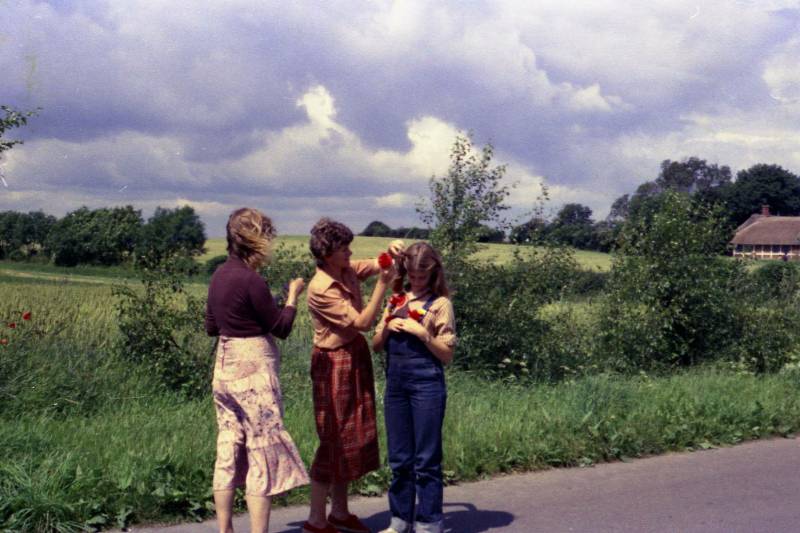 |
Aage and Mercia with Cubby and me in the garden of their house at Gaertnervanget, Lohals. Cubby and sister Bodil put flower in Andrea's hair |
|
After I had spent 3 months in Baghdad I flew to Denmark for two weeks single status leave. Cubby and the two youngest children, after eventually receiving money from our house sale, arrived in Copenhagen from South Africa at the same time as me. We travelled down together to Korsor by train and after struggling to carry our heavy baggage through the long station subway, took the ferry to Lohals in Langeland to Cubby’s parents’ house. Unfortunately they could not return to Iraq with me. Cubby suddenly required a hysterectomy, which could only be done at nearby Svenborg in some weeks time - in any case not much housing was complete on site. Benjamin attended Junior School at Lohals during this period and seemed to enjoy himself even though he understood no Danish.
When I was back on site, the Iraqi authorities stopped permitting companies from applying for residence permits on behalf of their staff. We then went in person to a small office where a scrum of expatriates up to 20 deep crushed against a counter trying to get attention. Many, including me, had to leave when the office closed without the required stamp. Later we were all called back to be personally fined for failing to get our residence permits in time. Offenders appeared to be citizens of all the nations of the world - Cubans, Brazilians, Filipinos etc all working on construction projects in Iraq. Indiscreetly I complained aloud in the queue about time wasting only to be overheard and reprimanded by one of the senior immigration officials.
An Iraqi girl in our department took us one Sunday to a large unspoilt natural freshwater lake quite unpolluted some 100 miles in the desert from Baghdad where we swam and picnicked, an idyllic spot. Later this same girl migrated to France and married one of the SB employees she had met on the project. Our consortium employed a number of Pakistani engineers and surveyors, cheaper than European staff in short supply, some of the engineers worked in my technical department. Because of common English language and my earlier experience in Pakistan, I found it often easier to socialise with them than with French colleagues out of working hours.
Much of the labour employed on the project was also recruited from the East, both Thai and Pakistani – there was little local labour available or willing to work in construction and in this boom period demand far outstripped possible supply.
Three months flashed by and the time came to return to Denmark to fetch my family. Cubby had now recovered from her operation performed free - there was evidently a reciprocal medical agreement for Danish and British citizens.
I went to get the required visas in Baghdad but apparently as I had been fined, the same official with whom I had argued, would only give me a one way exit visa and said I would have to reapply from abroad for a re entry visa. As this would take much time and probably involve a trip to France from Denmark, the Iraqi staff member accompanying me persuaded another official to issue it to me. I moved into our future house near the airport the night before my departure and unpacked our tin trunks forwarded to Iraq earlier.
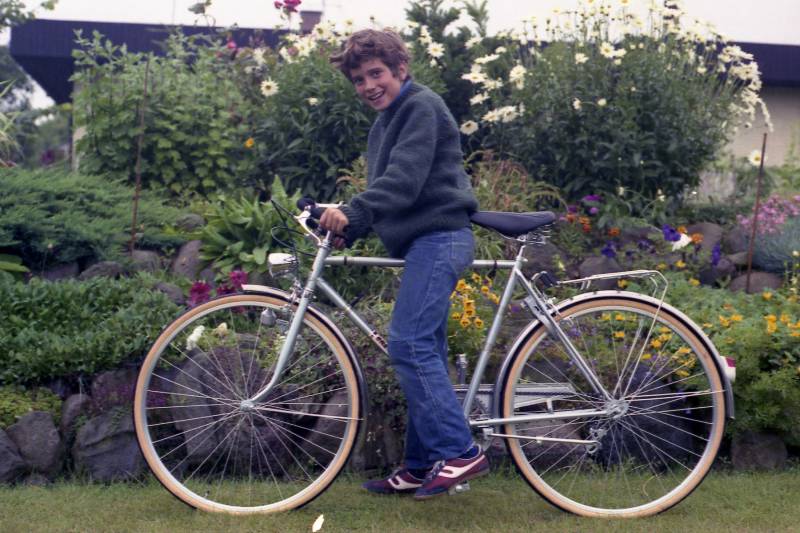 |
.jpg) |
Bens new bike scheduled to accompany us on the plane to Baghdad. Packed ready to leave for Baghdad |
|
In Lohals we prepared for our move to Baghdad and then stayed overnight in Bodil’s, Cubby’s sister, apartment in Copenhagen before going to Kastrup Airport. We checked in our baggage on the 23rd of September 1980 and were just about to proceed to immigration control when a loudspeaker announced that our flight had been cancelled — war had broken out between Iraq and Iran. I remembered that before my departure Iraqi Television had shown some military scenes of artillery guns being fired - apparently border skirmishes with Iran. The Airline suggested that we might fly to Amman in Jordan and then proceed by bus to Baghdad but we decided to check with Paris head office and they told us to come down to Paris.
It transpired that Irani missiles had passed low over the airport site causing no damage to our staff or works but frightening everyone considerably. The new Project Manager had decided to allow those staff and families who wished to, to leave. Almost all families had been bussed to Amman and then flew to Paris, but the Project Manager and some staff remained on site. For the present effective working was stopped on site pending developments. Later the Iraqis forced the Project Manager off the site as he had had the temerity to permit the repatriation of his staff without their apparent agreement.
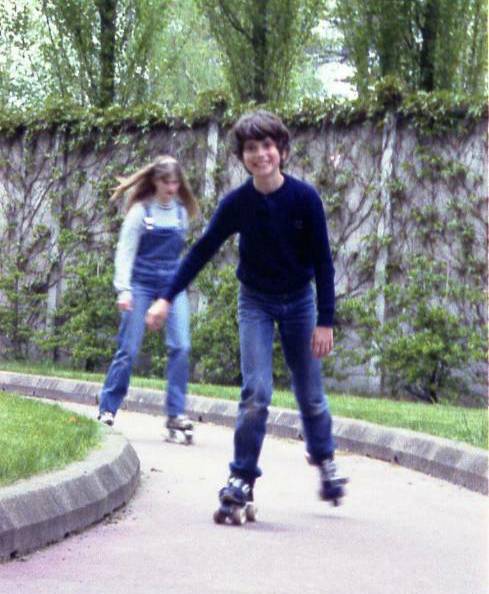 |
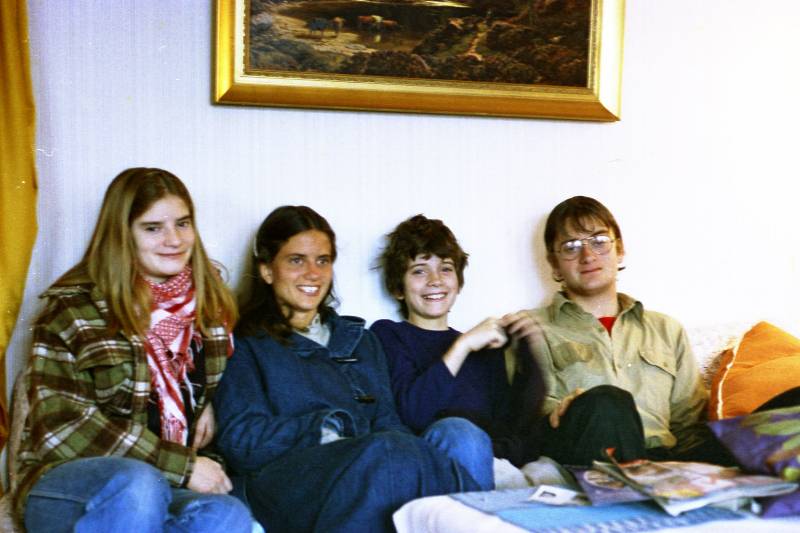 |
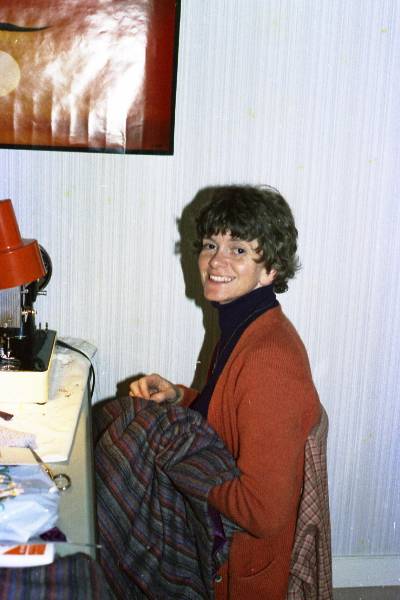 |
Ben And Andy skating in the grounds of our apartment in Versailles. From Cape Town, Karen (on holiday) and Christopher (en route to England to do his A-Levels) joins us for Christmas 1980. Nicky our eldest daughter stayed in South Africa. Cubby makes her own winter coat - still in good condition in 2006 |
||
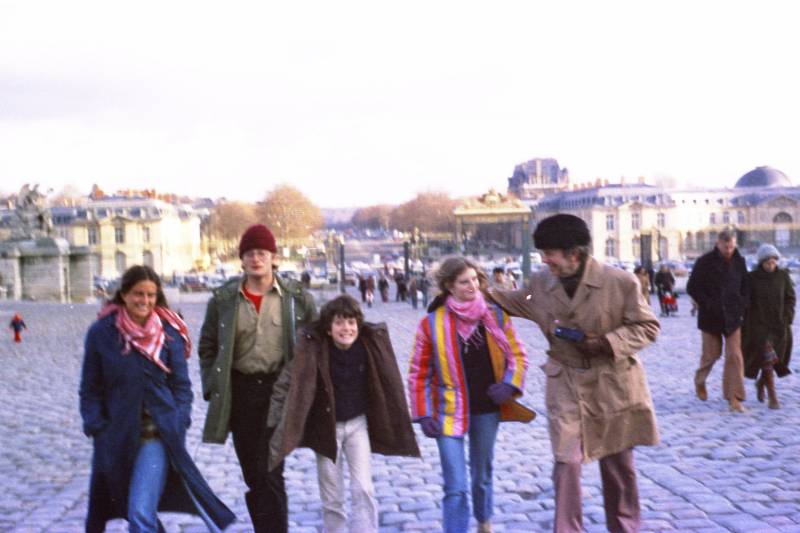 |
Aage and Mercia also came down from Denmark for Christmas. Aage with four of our children in the Versailles square which on most days is full of market stalls. |
We rented an apartment in Versailles. Andrea was accepted at the International school at St Germain en Laye, but Benjamin, who did not meet pedantic scholastic standards, went to a local school in Versailles in a special class for pupils learning French. Most of his classmates were immigrants from South East Asia with whom he got on well but he met few French boys. At the office I was not given much to do and was strangely excluded from design works or other activities still continuing, effectively I was on ‘hold’ until the decision was made to restart works on site.
After about 3 months it was decided to send staff back on bachelor status to Baghdad with incentive ‘danger pay’. I had signed a married contract and had already been a bachelor for nine months that year. With the uncertainty of the period of separation as the war was continuing, I decided not to return. I was not as enamoured of Saddam Hussein as were his eager arms suppliers, strange bedfellows - the United States getting revenge by proxy on Iran’s fundamentalists for their seizure of American hostages during Jimmy Carter’s presidency, the Soviet Union continuing as Iraq’s traditional supplier and France and Britain also out for a fast oil buck.
The French indeed besides involvement on many other projects were, in the early years of this war, were in the process of building a small ‘research’ nuclear plant which could have supplied Saddam Hussein with materials for nuclear weapons had it not been bombed and destroyed by the Israelis in mid 1981. Many Europeans initially predicted that this would be a short war lasting only weeks or months - the combatants they thought would not have the resolve to sustain the conflict longer. However the war continued for a bloody 8 years with an apparently unrecorded number of deaths. Iraq had borrowed money from their neighbouring ‘friends’ Saudi Arabia and Kuwait to sustain the war, but they 'unsympathetically' required repayment after the war. This was one of the factors later leading to Iraq’s invasion of Kuwait in August 1990, but was far in the future.
SB had in consortium with a German company obtained another large contract, the Riyadh Water Transmission Pipeline in Saudi Arabia. This would convey desalinised water from the gulf coast to Riyadh. Several pump-stations, storage tanks and the pipeline itself were to be constructed. For a month or so we flew each week from Paris to Dusseldorf where the planning was being done and returned for weekends in France. I was to be the senior assistant engineer to the French Civil Works Manager. But there was a snag - the German Partner had already appointed their man for this same position. An unexpected Christmas in France was celebrated with the arrivals from Cape Town of Christopher who had finished school and was to go England to take ‘A’ levels prior to going to university and Karen on holiday from nursing school. Cubby’s parents Aage and Mercia also visited from Lohals.
On being assured after Christmas that my position had been sorted out, I went to Riyadh in Saudi Arabia on a bachelor status with my family to follow later. Riyadh, in contrast with Baghdad, was a strict purdah society - hooded women and segregation of sexes. Women travelled in separate sections at the rear of buses and were not permitted to drive cars. Segregation of Blacks from Whites of course was common in Apartheid South Africa, but certainly there was no attempt to stop black women from driving private motor vehicles – but in Saudia Arabia all women were as a group discriminated against. Almost all workers and service staff were imported from the East contributing to an artificial society. Foreign run hotels were of a high standard and those with swimming pools tended to be focal points for expatriate men and a few wives and children. With alcohol not being permitted, we slaked our thirst with often chemical tasting non-alcoholic beer. We drove in the companies new Toyota cars roughly along the line of the pipeline from Riyadh across miles of sandy desert to Daharan on the Gulf where desalinated water was to be produced.
My position, however, had not been resolved - two persons were trying to do the same job and the Civil Works Manager was not on site to resolve the matter. Unsurprisingly relations deteriorated and the French Site Agent sent me back to France.
My move to a French Contractor was looking decidedly unpromising, I now hoped, like Mr Micawber, something would turn up.
[1] Consortiums, whether French or other nationalities, frequently seemed to disagree and only seemed to work together because they did not have sufficient resources on their own – also risks had to be spread.
[2] Districts
[3] This was apparently the case in Baghdad where most were Sunni Muslims, but probably purdah dress applied in other areas where Shiite Muslims predominated
[4] A steel cylinder with a flat metal shoe was driven displacing the soil, the pile was then concreted and the steel cylinder extracted while the concrete was still unset filling the voids up to the soil face along its height.
index memoir -
homepage - contact me at